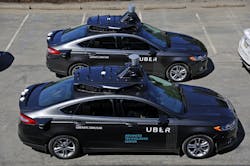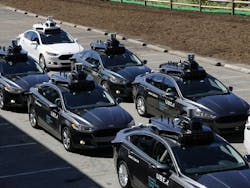Is there less desire for driverless vehicles than thought?
Ponder this for a moment: what if autonomous vehicle (AV) technology is getting too far ahead of itself in terms of acceptance by the general public?
That is, what if a majority of motorists – even among the Millennial and Gen Z populations – actually prefer to “manually” drive their vehicles, as opposed to letting a computer do all the work?
Well, if recent research conducted by global consulting firm Ketchum is any guide, the incoming generation of car buyers is more worried than excited about the concept of self-driving cars, with concerns about safety, viruses, hacks or other malfunctions topping the list.
Ketchum surveyed nearly 1,000 16- to 24-year-olds about the future of transportation, including self-driving cars and ride sharing. Far from suggesting car ownership may become obsolete, Ketchum’s study found that 92% of next-generation car buyers either already own a car or plan to buy one.
They also share a passion for physically being in control behind the wheel, associating driving with “independence, freedom and fun,” noted Lisa Sullivan, executive vice president and director of Ketchum's North American technology practice, in the firm’s report, which is entitled The Next-Gen Guide to the Connected Ride.
She added that while the 39 million members of the Gen Z generation in the U.S. – aged 16 to 24 at the time they were polled – have “grown up steeped in technology, so you might expect them to be ahead of the curve in terms of their readiness to embrace the future of transportation,” that doesn’t seem to be the case where AVs are concerned.
Here are some more findings from Ketchum’s study where Gen Z drivers are concerned:
- Of those who have a driver's license, 78% of 21- to 24-year-olds and 58% of 16- to 20-year-olds have their own vehicle.
- Among those who have a license but don't have their own vehicle, 61% plan on getting one as soon as they can afford it; another 19% plan on getting their own vehicle as soon as they begin their career.
- Nearly half of those who can drive (45%) say they love driving and never want to give it up.
- The majority (61%), especially females (65%), say driving makes them feel more independent, and 53% (48% male and 58% female) see driving as a necessary skill as an adult.
- Some 39% overall are worried about self-driving technology, while 29% say they are excited about it. In fact, more respondents (35%) are excited about flying cars compared to driverless vehicles.
- Only 23% of those who have or are planning to get a driver's license say they can see themselves buying a self-driving vehicle (30% of males vs. 18% of females).
- Only 25% think driverless cars will make the roads safer, while 43% are concerned that self-driving cars could get hacked.
- Just 18% think their next vehicle is more likely to be made by a technology company than a traditional car maker (that must be a relief to GM, Ford, FCA and others OEMs, methinks).
Thus, not surprisingly, Ketchum’s poll found Gen Z drivers are three times more likely to choose an environmentally friendly car over a fast one (74% vs. 26%).
And guess what: price still matters – a lot. Ketchum’s poll found that when shopping for a vehicle, price (75%) and safety (74%) are at the top of the Gen Z driver’s list.
However, Paul Wood, partner and head of Ketchum's transportation and automotive practice, made an interesting comment within the firm’s study: in essence, Gen Z drivers could be convinced to embrace driverless cars if details regarding this technology is not only via “visual” communicated but backed up with data.
"Trust is vital to this audience, and their cautious approach to the future of transportation gives us clues as to how to open the dialogue with them,” he said.
“Language choices are critical and message testing is a must; technical information and data are better shown than explained; and absolutely everything must be proven over time,” Wood added. “Only once they feel secure that new technology can play a positive role in their lives can they begin to embrace adoption."
Something to keep in mind as AV development continues to charge forward.


